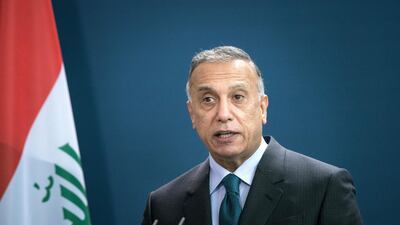Iraq will hold an early parliamentary elections on June 6 2021, the country's Prime Minister Mustafa Al Kadhimi announced on Wednesday.
Anti-government protesters, who staged months of mass demonstrations last year and were killed in their hundreds by security forces, demanded early elections and changes to the country’s voting process following accusations of fraud in the 2018 elections.
“We have set the June 6 as the date for elections and we insist on moving forward to make it a success,” Mr Al Kadhimi said, added that he had directed the country's electoral commission to start preparations for a fair and transparent ballot this week.
The prime minister said the electoral system is in need of the government’s support to ensure that all "obstacles” are removed and bureaucratic procedures are smoothly operated to ensure that the vote will become a “success”.
The 329-member chamber was last elected in May 2018. The vote is held every four years, but the protesters have been demanding early elections.
Iraq’s parliament last month passed the final version of a new electoral law despite objections from some political parties.
President Barham Salih then approved amendment to the country’s electoral laws.
The reforms came in response to demands from protesters who urged for the inclusion of independent candidates to win a seat in parliament.
“Reforming Iraq’s electoral system has been a national imperative to secure free and fair elections away from intimidation and fraud,” Mr Salih said at the time.
The new law changes each of the country’s 18 provinces into several electoral districts and prevents parties from running on unified lists, which has in the past helped them easily sweep all the seats in a specific province.
Instead, the seats would go to whoever gets the most votes in the electoral districts.
“This is a prerequisite to empowering new generation of political leaders to end Iraq’s unrelenting governance crisis, to assure peace and prosperity,” he said.
Mr Salih said there is a vital need for free, fair, and transparent balloting that would restore the Iraqi citizens’ confidence in the legitimacy of the process.
The electoral commission said on Tuesday it is in the process of completing the voter registration procedure as well as ensuring that accreditation of candidates, political parties and alliances are recorded in the system.
This is done to ensure that the election will be held on time, the commission said in a statement.

























